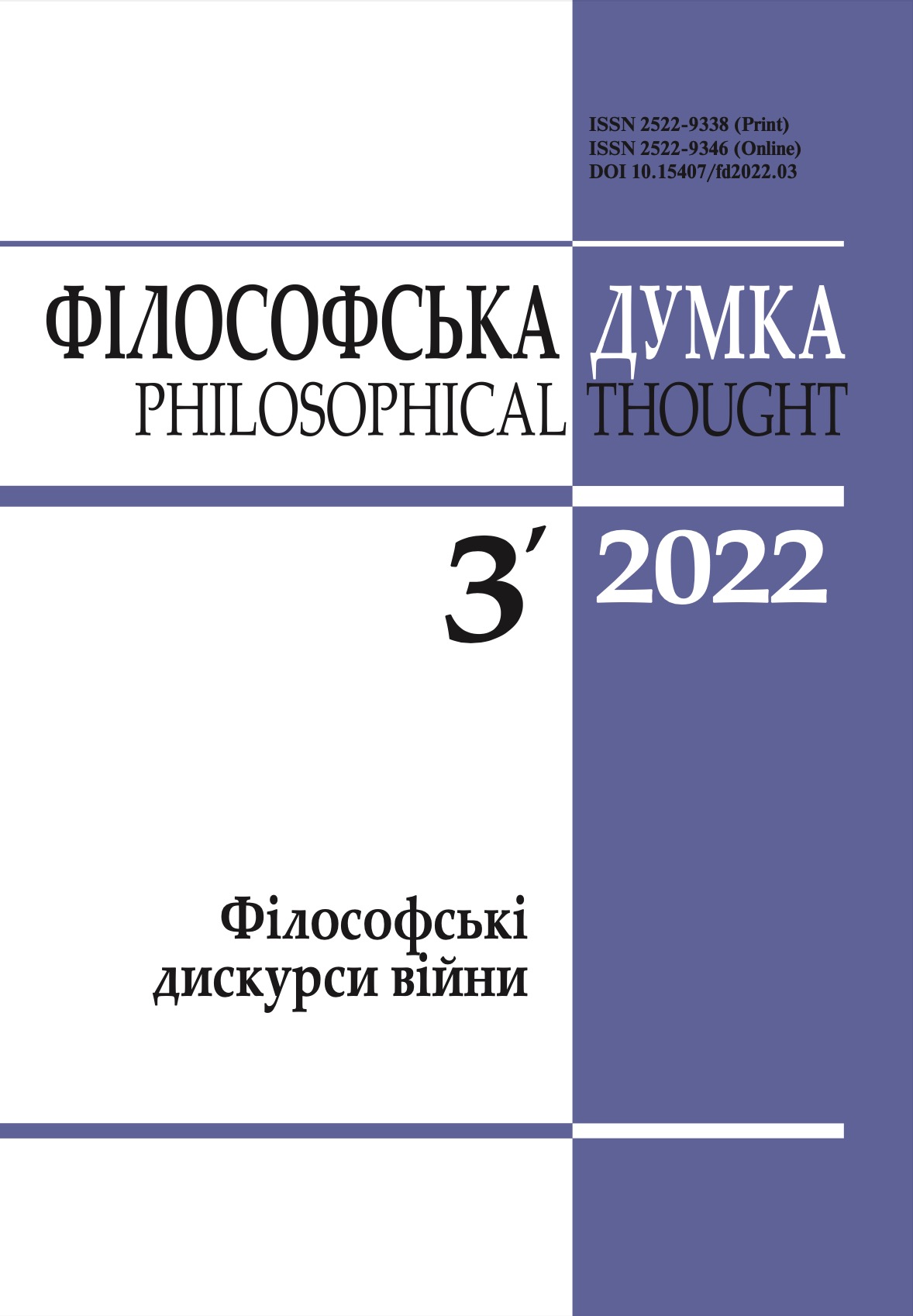PHILOSOPHY AND DISCOURSE OF WAR: CONFLICT OF WORLDS AS THE LIMIT OF JURGEN HABERMAS’S COMMUNICATIVE THEORY
DOI:
https://doi.org/10.15407/fd2022.03.064Keywords:
life world, communicative philosophy, Jürgen HabermasAbstract
The article is a philosophical response to the oped of the German philosopher Jürgen Habermas Krieg und Empörung, published by him in the Süddeutsche Zeitung in April 2022. The op-ed demonstrates the philosopher’s view on ideological disputes and political debates or “indigna- tion” (Empörung) in public sphere in both Germany and the EU concerning an attempt to de- velop a unanimous policy to help Ukraine with weapons against Russia’s military aggression. The authors presume that Habermas published the accountable message of a responsible citizen that means it should be also taken as based on his theoretical achievements. The article consists of two parts. The first part sets out the main arguments of the philosopher’s newspaper article, which ends with a recommendation of compromise and partnership negotiations with the aggressor de facto due to the losses of Ukraine. The second part is an attempt by the authors to clarify the main preconditions and premises of Habermas’s communicative philosophy, which demonstrate the fundamental limitation of its explanatory power for this type of radical dissent, which is war. First of all, the authors suggest, it is the idea of pacification in interethnic relations, which forms the intellectual mood after World War II and finds its philosophical expression in the discovery of a priori foundations of understanding (Apel, Habermas) and ideas of developing formal prag- matics of communication. Attention to the latter allows the authors to demonstrate how consist- ent analysis of a priori (counterfactual) conditions of communication is considered by Habermas primarily in the historical perspective of positive dimensions of social integration - democratic equality, freedom, justice for participants of communicative interaction. The article concludes with a detailed analysis of the significance of the concept “lifeworld” as one of the central con- cepts within communicative theory and an analogue of “form of life” and “culture”. The authors argue the idea of perspective creating a common lifeworld for all in the processes of communication is fundamental to the works of the philosopher. The article concludes that the regulative idea of the single world as a basic ontological assumption of communicative theory does limit its ex- planatory capacity in terms of a war situation as a clash of different cultural worlds.
References
Bystrytsky, Ye. (2022). Ordinary Habermas. Ukrainian Truth, May 5. [In Ukrainian]. Retrieved from: https://blogs.pravda.com.ua/authors/bystrytsky/627348bae29c7/.
Bystrytsky, Ye., Zymovets, R., Proleiev, S. (2020). Communication and culture in the global world. [In Ukrainian]. Kyiv: Dukh i litera. [=Бистрицький, Зимовець, Пролеєв 2020]
Delahunty, R.J., Yoo, J. (2010). Kant, Habermas and Democratic Peace. Chicago Journal of In- ternational Law, 10 (2:5). Retrieved from: https://chicagounbound.uchicago.edu/cjil/ vol10/iss2/5.
Grayling, A.C. (2017). War. An Enquiry. New Haven, London: Yale University Press. Habermas, J. (1984). The Theory of Communicative Action. S.l.: Beacon Press.
Habermas, J. (1989). The Theory of Communicative Action. Vol. 2. Lifeworld and System: A Critique of Functionalist Reason / Tr. by Th. McCarthy. Boston: Beacon Press.
Habermas, J. (1998). Between Facts and Norms. Contribution to a Discourse Theory of Law and Democracy / Tr. by W. Rehg. Cambridge, MA: The MIT Press.
Habermas, J. (2001). On the Pragmatics of Social Interaction. Preliminary Studies in the Theory of Communicative Action / Tr. by B. Fultner. Cambridge, MA: The MIT Press.
Habermas, J. (2001). On the Pragmatics of Social Interaction. Preliminary Studies in the Theory of Communicative Action / Tr. by B. Fultner. Cambridge, MA: The MIT Press.
Habermas, J. (2012). The Crisis of the European Union. A Response / Tr. by C. Cronin. Cambridge, MA: Polity Press.
Habermas, J. (2014). Between Naturalism and Religion / Tr. by C. Cronin. Cambrige, MA: Polity Press.
Habermas, J. (2017). Truth and Justification / Ed. and tr. by B. Fultner. Cambrige, MA: Polity Press.
Habermas, J. (2018). Philosophical Introductions. Five Approaches to Communicative Reason / Tr. by C. Cronin. Cambrige, MA: Polity Press.
Habermas, J. (2022). Krieg und Empörung. Süddeutsche Zeitung, 28. April. Retrieved from: https://www.sueddeutsche.de/projekte/artikel/kultur/das-dilemma-des-westens-juergen- habermas-zum-krieg-in-der-ukraine-e068321/?reduced=true
Höffe, O. (2022). Warum herrscht jemals Frieden? Neue Zürcher Zeitung, 2.April. Retrieved from: https: //www.nzz.ch/feuilleton/ukraine-krieg-kants-traum-vom-ewigen-frieden-ist-nicht-gep- latzt-ld.1677445?reduced=true); Žižek, S. (2022).
Nancy, L.-J. (2004). Being: singular and plural / Tr. by V.V. Furie, ed. by T.V. Shchitsova. [In Rus- sian]. Minsk: I. Logvinov.
Philosophers for Ukraine -- Retrieved from: https://philosophersforukraine.com.ua/?fb- clid=IwAR3BcNjKGcGl1Jhzu7XEG0fzEY8kxG4nuWzIBWyqsXls-aUYlcGDilI6NlY
Yermolenko, A. (2022). Frankfurter Allgemeine Zeitung. Antwort auf J rgen Habermas:Widerstand statt Verhandlung, 20.05.2022. Retrieved from: https://www.faz.net/aktuell/feuilleton/de- batten/der-ukrainische-philosoph-yermolenko-antwortet-habermas-18044530.html.
Zabala, S., Gallo, C. (2022). NATO’s Philosophers. Aljazeera, 9 May. Retrieved from: https:// www.aljazeera.com/opinions/2022/5/9/natos-philosophers-who-shape-the-strate- gies-of-alliance.
Žižek, S. (2022). Heroes of the Apocalypse. Project Syndicate, May 11. Retrieved from: https:// www.project-syndicate.org/onpoint/european-response-to-ukraine-war-test-for-climate- other-crises-by-slavoj-zizek-2022-05?utm_term=&utm_campaign=&utm_source=ad- words&utm_medium=ppc&hsa_acc=1220154768&hsa_cam=12374283753&hsa_ grp=117511853986&hsa_ad=499567080225&hsa_src=g&hsa_ tgt=aud-1249316000397%3Adsa-19959388920&hsa_kw=&hsa_mt=&hsa_net=ad- words&hsa_ver=3&gclid=CjwKCAjwkYGVBhArEiwA4sZLuCtalzqJ8sSMKu0hRNPv_ ezfDj4e1EDN64ia23jGlepVVKpnSYTDVhoCBLsQAvD_BwE).
Downloads
-
PDF (Українська)
Downloads: 759
Published
How to Cite
Issue
Section
License
Authors who publish with this journal agree to the following terms:
- Authors retain copyright and grant the journal right of first publication.
- Authors are able to enter into separate, additional contractual arrangements for the non-exclusive distribution of the journal's published version of the work (e.g., post it to an institutional repository or publish it in a book), with an acknowledgement of its initial publication in this journal.
- Authors are permitted and encouraged to post their work online (e.g., in institutional repositories or on their website) prior to and during the submission process, as it can lead to productive exchanges, as well as earlier and greater citation of published work (See The Effect of Open Access).


